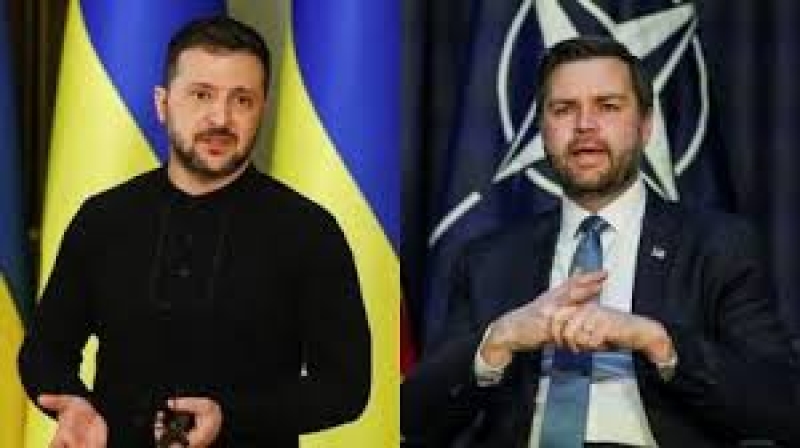- Irregularities, injustice will no longer be accepted in politics: Jamaat Ameer |
- 2 arrested in Jhenaidah for allegedly selling madrasa student |
- Koko’s wife campaigns for Tarique in Dhaka-17 |
- Bangladeshi Expats Cast 4.58 Lakh Postal Votes |
- IMF Forecasts Bangladesh GDP to Rebound to 4.7% in FY26 |
Vance to Meet Zelenskyy Amid Concerns Over U.S.-Russia Ukraine Talks

Vice President JD Vance reiterated the U.S. demand for NATO members to increase defense spending on Friday, ahead of a crucial security meeting in Europe. This comes amid growing uncertainty about the Trump administration’s foreign policy direction, particularly following a phone call between U.S. President Donald Trump and Russian President Vladimir Putin, where they pledged to collaborate on ending the ongoing conflict in Ukraine.
Ukraine’s future remains the central topic at the Munich Security Conference, with many in Europe hoping Vance’s upcoming meeting with Ukrainian President Volodymyr Zelenskyy will shed light on Trump’s plans for a negotiated resolution to the war.
Before meeting with Zelenskyy, Vance met NATO Secretary-General Mark Rutte, emphasizing the need for European nations to shoulder more defense responsibilities. Currently, 23 out of NATO’s 32 members meet the alliance’s defense spending target of 2% of GDP.
“NATO is crucial, but it needs to evolve for future challenges,” Vance stated. "A key part of that evolution is ensuring Europe contributes more, allowing the U.S. to focus on growing threats in East Asia."
Rutte agreed, adding, “Europe must step up its defense spending.”
Just hours before the Vance-Zelenskyy meeting, a Russian drone struck the protective shell around the Chernobyl Nuclear Power Plant, prompting alarm in Kyiv. Ukrainian authorities reported no increase in radiation, a claim echoed by the U.N. nuclear agency. However, Kremlin spokesman Dmitry Peskov denied the attack had occurred.
U.S. Secretary of State Marco Rubio was scheduled to join Vance and Zelenskyy but was delayed after a mechanical issue grounded his flight. The State Department confirmed Rubio would fly on a different plane, though it remained unclear if he would arrive in time for the talks.
Trump’s recent remarks regarding the Ukraine war have further complicated the situation. In his conversation with Putin, Trump expressed concerns about the high human cost of the conflict and hinted at a deal that could involve Ukraine ceding territory seized by Russia since its annexation of Crimea in 2014.
"The Ukraine war has to end," Trump said Thursday. "Young people are being killed at levels we haven’t seen since WWII. It's a ridiculous war."
Trump’s ambiguous stance has left European leaders in a bind, with questions rising about how NATO’s security framework will evolve under U.S. leadership and whether Ukraine can continue to rely on the billions of dollars in support from the Biden administration.
“There can be no negotiation about Ukraine without Ukraine,” stated U.K. Defense Secretary John Healey at NATO talks. He stressed that any peace talks must center on Ukraine’s participation and voice.
Trump, along with U.S. Defense Secretary Pete Hegseth, has expressed skepticism about Ukraine's potential NATO membership, as well as the prospect of Ukraine regaining territory lost to Russia. “I don’t see a scenario where Russia allows Ukraine to join NATO,” Trump remarked.
Despite these challenges, British Prime Minister Keir Starmer reassured Zelenskyy in a call on Friday, reaffirming the U.K.'s commitment to Ukraine’s eventual NATO membership.
At NATO headquarters, Hegseth echoed Trump’s pragmatic stance, suggesting that the possibility of a return to pre-2014 borders was unrealistic. “Both Russia and Ukraine will not get everything they want, but negotiations will have to involve both sides,” he said.
Vance, in an interview with The Wall Street Journal, warned that the U.S. could take further action, including sanctions or military measures, if Putin refuses to agree to a peace deal that ensures Ukraine’s sovereignty.
“We have economic and military tools at our disposal,” Vance stated, highlighting the Trump administration’s commitment to holding Russia accountable.
While Vance's reassurances may have tempered Zelenskyy’s concerns, they cannot replace the military and financial support previously offered by the Biden administration.
Zelenskyy, though, acknowledged his discomfort with Trump’s direct talks with Putin but remained firm in his stance. “We cannot accept any agreements made without us,” he stated Thursday, during a visit to a nuclear power plant in western Ukraine.
The Kremlin’s response was dismissive, with Peskov stating there were “no updates” on peace talks, despite Trump’s claims that discussions would take place at the Munich conference.
In Europe, the Trump administration’s approach is causing alarm. French Deputy Foreign Minister Benjamin Haddad described Europe as being at a crossroads, emphasizing that the continent must reduce its reliance on the U.S. for its security. He warned that a Russian victory in Ukraine could have far-reaching consequences, particularly in Asia.
“We are not fully grasping how much our world is changing,” Haddad said Thursday. "The U.S. must understand that if we lose Ukraine, we all lose."

